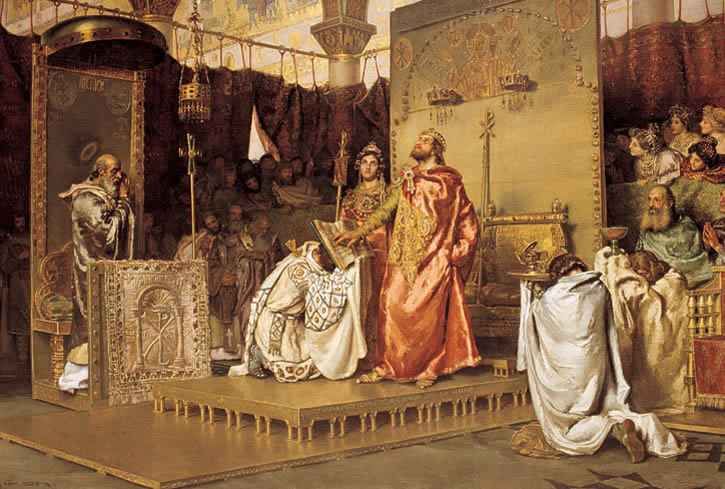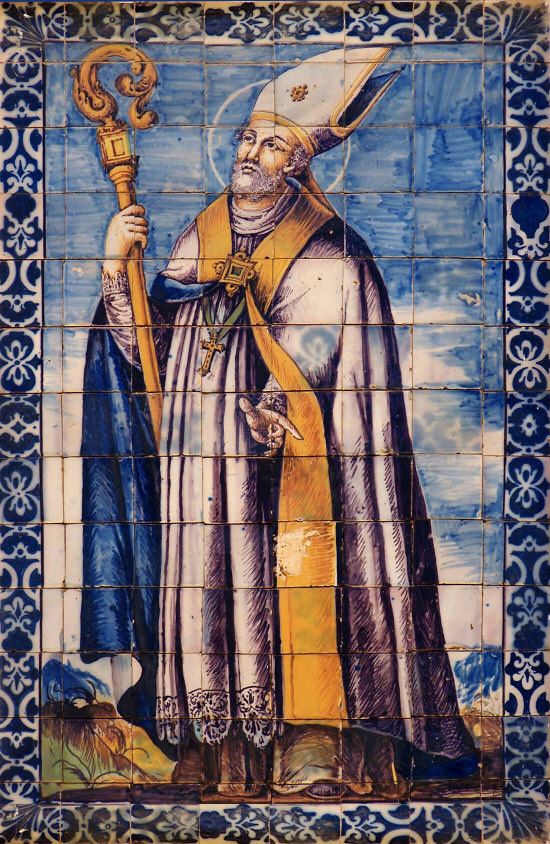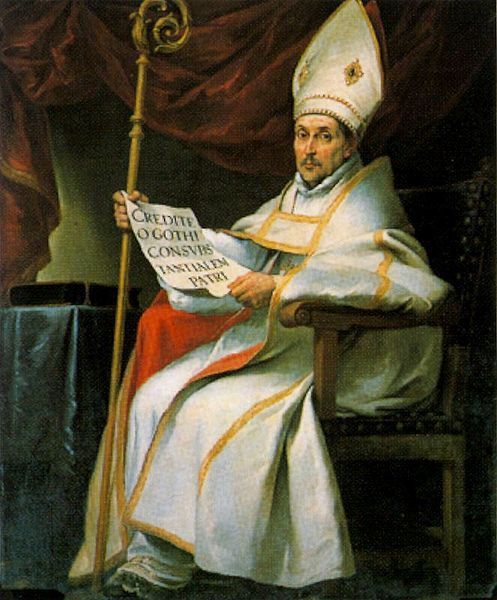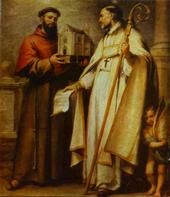 Spain, at that time in history, was experiencing considerable political upheaval, with the Visogoths dominating part of the territory. Not only had this invading force captured much of the land, their rulers had also spread the Arian heresy amongst the people, with many of the congregations and bishops accepting this affront to the divinity of Christ. Upon his election as bishop, Saint Leander immediately began to combat this heresy with all his strength, relying on the Lord, and seeing almost immediately the fruits of his labor. The heresy began to lose hold over the people, including the two sons of the Visogothic King Leovigild, Hermenegild and Reccared. These conversions angered the king considerably, and Leander was exiled to Constantinople.
Spain, at that time in history, was experiencing considerable political upheaval, with the Visogoths dominating part of the territory. Not only had this invading force captured much of the land, their rulers had also spread the Arian heresy amongst the people, with many of the congregations and bishops accepting this affront to the divinity of Christ. Upon his election as bishop, Saint Leander immediately began to combat this heresy with all his strength, relying on the Lord, and seeing almost immediately the fruits of his labor. The heresy began to lose hold over the people, including the two sons of the Visogothic King Leovigild, Hermenegild and Reccared. These conversions angered the king considerably, and Leander was exiled to Constantinople.In Constantinople, Leander met and became close friends with the Papal Legate stationed there, the future Pope Saint Gregory the Great. This action earned him the king's wrath and exile to Constantinople, where he met and became close friends of the Papal Legate, the future Pope Gregory the Great. Saint Leander served as a contemporary and advisor to Saint Gregory, encouraging him to write his famous commentary on the Book of Job entitled the “Moralia.”
After some time, King Leovigild summoned Leander back to Seville. Having experienced a change of heart, he wished for Leander to instruct his son Reccared—who would inherit the throne—in the ways of the faith. Through Leander’s instruction and model, the people of Spain were converted. He presided over the third Council of Toledo, which upheld the consubstantiality of the Trinity, and brought about many moral reforms in the Church. Saint Leader further wrote an influential Rule for Spanish nuns and introduced the practice of praying the Nicene Creed at Mass. A prolific writer, unfortunately most of his works have been lost to history, although much of the correspondence written by Gregory the Great to his attention remains extant.
 |
| King Leovigild rejects Arianism and embraces the true faith in front of Saint Leander |
 Saint Leander held to the truth of the faith, despite overwhelming opposition and exile. Not only did he believe the truth, he sought to bring others to the light of the faith through tireless work. As modern Christians, we rarely consider the work of these early defenders of the faith, who lived their lives in constant proclamation of the Kingdom of Heaven. We might, during this Lenten season, take a lesson from these holy men and women, not only believing our faith, but living it visibly as witness to others!
Saint Leander held to the truth of the faith, despite overwhelming opposition and exile. Not only did he believe the truth, he sought to bring others to the light of the faith through tireless work. As modern Christians, we rarely consider the work of these early defenders of the faith, who lived their lives in constant proclamation of the Kingdom of Heaven. We might, during this Lenten season, take a lesson from these holy men and women, not only believing our faith, but living it visibly as witness to others!Saint Leander, pray for us that we will always seek truth, and never shy away from defending it. In Christ’s Name, we pray. Amen






No comments:
Post a Comment
Thanks for leaving a comment. If you wish to submit a prayer request, however, please do so above, using the "Contact" tab.